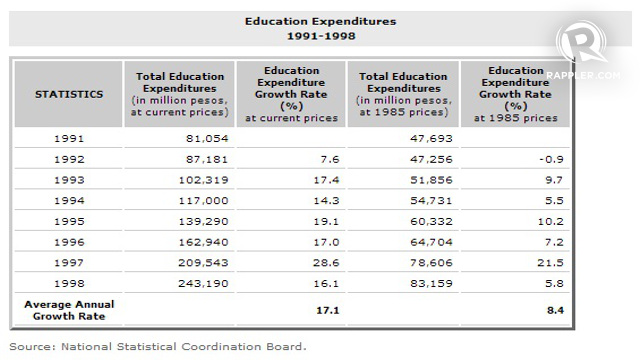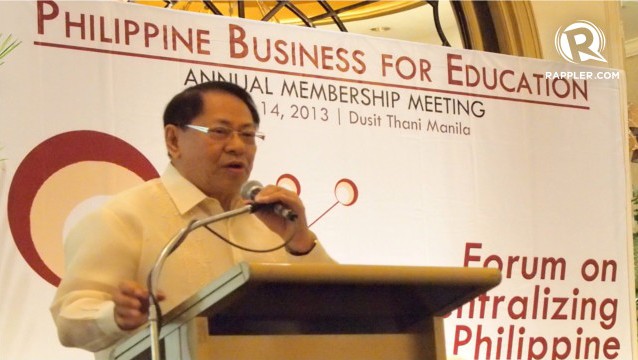SUMMARY
This is AI generated summarization, which may have errors. For context, always refer to the full article.

MANILA, Philippines – The oft-neglected and rarely-fought-for civil right to access quality and affordable education was brought to the fore by the tragic death of 16-year-old Kristel Tejada, who took a leave of absence after being unable to pay her tuition at the University of the Philippines Manila.
Government-funded education is suddenly the talk of the town, proving time and again how a face can be more powerful than a number. There is, however, undeniable wisdom found in numbers.
Unfortunately, in terms of resource allocation, government’s sense of priority for education is not nearly enough given United Nations standards. To date, the Philippines is yet to comply with the UN-prescribed 6% share of education spending vis-a-vis national GDP.
The current education expenditure to GDP ratio is at 2.45%, based on the official computation of the Department of Education (DepEd) Finance and Administration office. It is higher than last year’s reported 2.10% share, but a far cry from 1997 when education spending accounted for a 3.8% share in the country’s GDP.
It is easy not to accord education the importance it deserves. Economists call it “hyperbolic discounting” which refers to the human tendency to prefer immediate rewards over long-term gains because of the time factor.
Thus, in most depressed areas in the country, we have parents who would, out of poverty, have their children sell candies or help out in the family farm on school days instead of sending them to school to enhance their intellectual capacities and learn in the classroom.
We have adapted the Conditional Cash Transfer (CCT) scheme as a counter to hyperbolic discounting. It has been working thus far, with school attendance of 12 to 14 year old students in CCT barangays 5% higher than in non-CCT barangays.

The provision of quality education can drain resources in the here and now, but the empowering nature of, and the benefits attached to, education demand that it be prioritized.
Of course, education gets the largest percentage in each year’s budget appropriation. Our legislators are duty-bound by the Constitution (Sec. 5, Article XIV) to appropriate a larger sum to education compared to other sectors.
Education reforms needed
On the heels of Tejada’s death, left-wing and right-wing pedants hijacked the conversation and made it about them. What should have been a discourse on policy formulation towards greater access to education was transformed into a debate on whether the suicide incident should be used or alluded to in order to push a cause forward.
Yet there are already pending legislative pieces mandating an automatic 6% of GNP to be appropriated for education. The original bill was a brainchild of University of the Philippines (UP) Diliman’s KAISA, the university’s ruling party for the next academic year.
Under KAISA’s “Six Will Fix” campaign, certain aspects of state largesse whose benefits can be derived from education anyway are to be diverted wholly to subsidize public education.
The state of our education, however, is a problem that concerns not only funding but also policy formulation and implementation. One cannot simply ask for a raise in the budget and assume it to work like a panacea. At the same time, one cannot cry foul over a “flawed system” without proposing an alternative to substitute the existing scheme or without issuing recommendations to complement it.
Create legacy fund for education
In a forum hosted by the Philippine Business for Education on Thursday, March14, Sen Edgardo Angara advocated for the creation of a legacy fund for education. He proposed that legislation be passed automatically allocating state income from natural resource extraction and lottery to the budget for education.
“I think we can get it done this year when the new Congress opens,” Angara said.
It makes perfect sense. If the government is unable to divide the budgetary spending responsibly such that education gets its deserved share, then it must work towards expanding the overall budget per se by securing steady sources of funding.
We should. If we really care about education. – Rappler.com
Add a comment
How does this make you feel?

There are no comments yet. Add your comment to start the conversation.